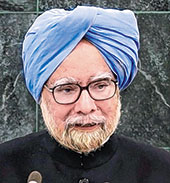Divine diplomacy: build Russian church, let temple stay — from Telegraph India
by CHARU SUDAN KASTURI

Indian Prime Minister Manmohan Singh
Render therefore unto Caesar the things which are Caesar’s; and unto God the things that are God’s
Matthew 22:21
New Delhi, Oct. 16: The paths are about to cross on the table of high diplomacy.
Places of worship have crept into the agenda of summit talks between President Vladimir Putin and Prime Minister Manmohan Singh next Monday.
Moscow plans to ask for permission to build a Russian Orthodox Church in Lutyen’s Delhi, senior officials from both nations have told The Telegraph.
In exchange, Russia will indicate that the federal government headed by Putin will intervene to save that country’s only Krishna temple from demolition threatened by local Moscow authorities and calm a rare irritant in ties between India and its oldest strategic ally.
The International Society for Krishna Consciousness (ISKCON), that built the Moscow temple and runs it, has also written to Prime Minister Singh seeking his intervention to save the temple, opposed by sections of the Russian Orthodox Church.
“We have raised our concerns over the threat of demolition with Russia earlier too, and we’ll look at any possible solution,” an official here said. “Tensions of this kind, though seemingly minor, have the potential to trouble people-to-people relations.”
Singh’s October 21 meeting with Putin in Moscow will be dominated by temporal matters such as differences that are holding back the sale of two Russian nuclear reactors for the Kudankulam power plant in Tamil Nadu, defence deals that Moscow is eying and trade and investment. India is also mulling leasing a nuclear submarine from Russia, especially after INS Sindhurakshak sank in August after a series of explosions on board.
But both nations are keen to find a quick resolution on the shrines as well, officials said.
The Russian Orthodox Church has emerged as a key Putin ally in recent years and, in the past few months, has stood by the Russian President in his push for widely criticised anti-gay laws.
Putin has, in turn, contended that the Church should have an enhanced role in Russian life, a position he would have struggled to take publicly in his earlier avatar as an officer of the Soviet KGB.
The Russian Orthodox Church, which had enjoyed the patronage of the Tsars before the Russian Revolution of 1917, was driven off its perch of primacy under the Soviet Union. Its land and property were confiscated, and members were harassed and persecuted.
Receiving the State’s support to set up a shrine overseas — that too in India, a Soviet ally — would have been unthinkable 25 years ago, a Russian diplomat said.
 The Church slowly regained its prominence in 1988 after religious regulations were eased under Mikhail Gorbachev. That was also the year when the Gorbachev administration formally recognised the Hare Krishna movement — the predecessor of ISKCON.
The Church slowly regained its prominence in 1988 after religious regulations were eased under Mikhail Gorbachev. That was also the year when the Gorbachev administration formally recognised the Hare Krishna movement — the predecessor of ISKCON.
The Russian wing of ISKCON says it has over 25,000 followers in the country. But in 2004, Moscow authorities demolished an earlier temple because they needed the land to build a metro station.
A second temple was built at a cost of $2.5 million (Rs 15 crore) through donations but Moscow officials withdrew the permission and asked ISKCON to vacate the property by July this year.
After India intervened diplomatically, that deadline was extended. Russia’s proposal offers the chance of a more lasting resolution.
The Russian Orthodox Church, one of the largest of the Eastern Orthodox congregations, had opened a parish in New Delhi in 2011. But it has so far worked out of the Russian embassy here without any building of its own.
At the summit talks in Moscow, Russia plans to ask India to allow it to build a church on diplomatic property it already rents out for the Russian Centre of Science and Culture on New Delhi’s Ferozshah Road, barely a kilometre from Parliament.
If the external affairs ministry and the Centre give the green signal, the customary clearances will have to be secured from the civic authorities in New Delhi.








